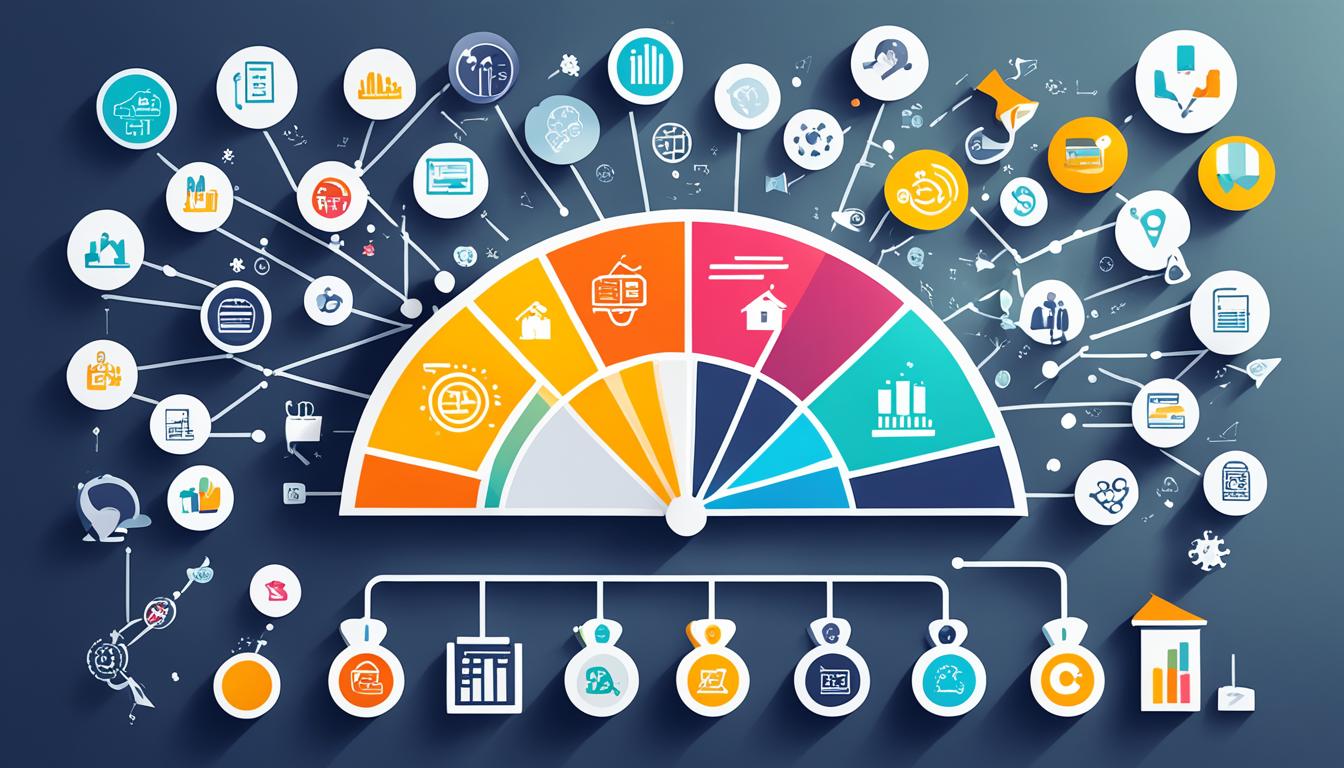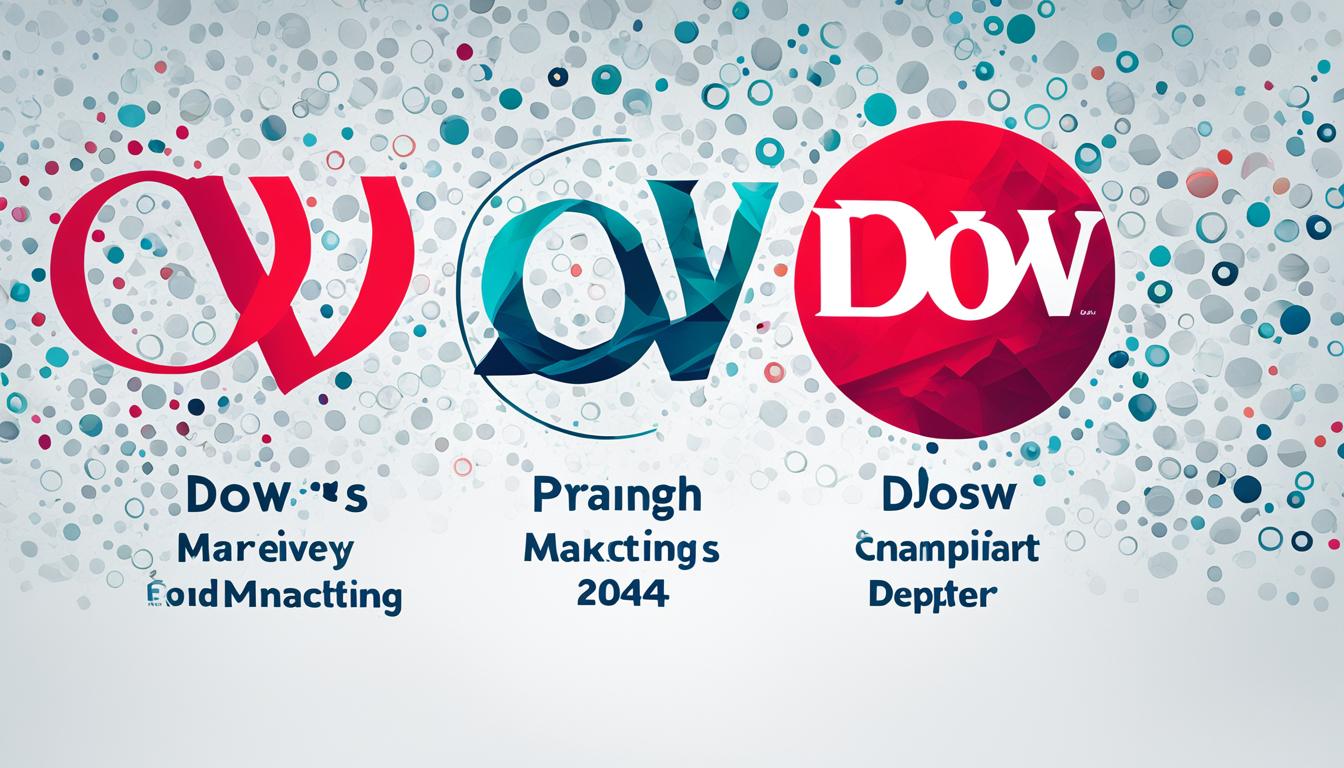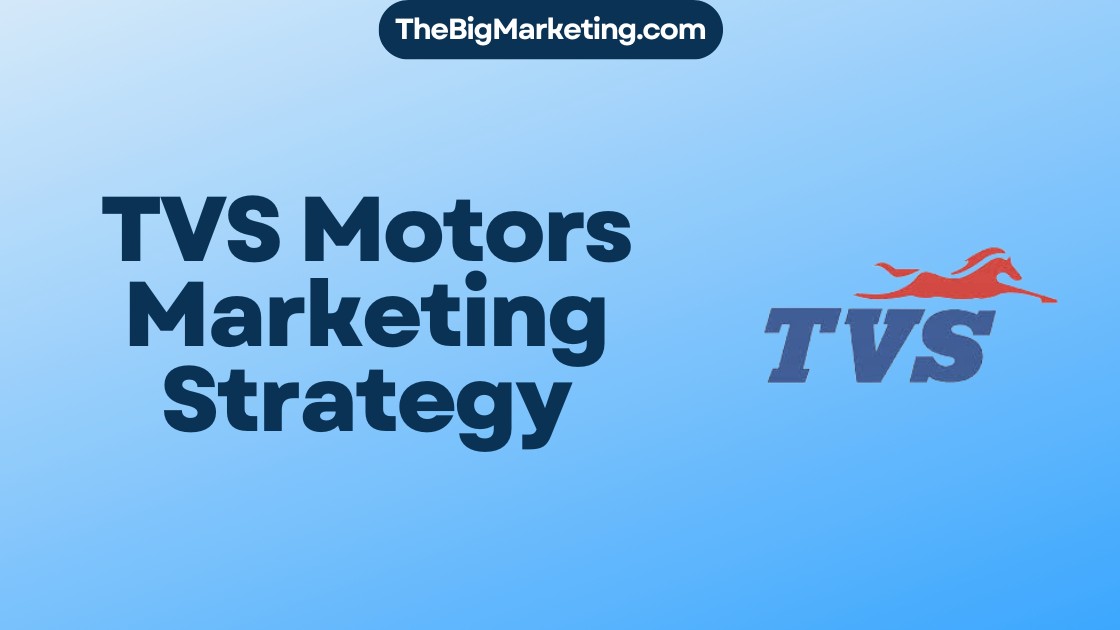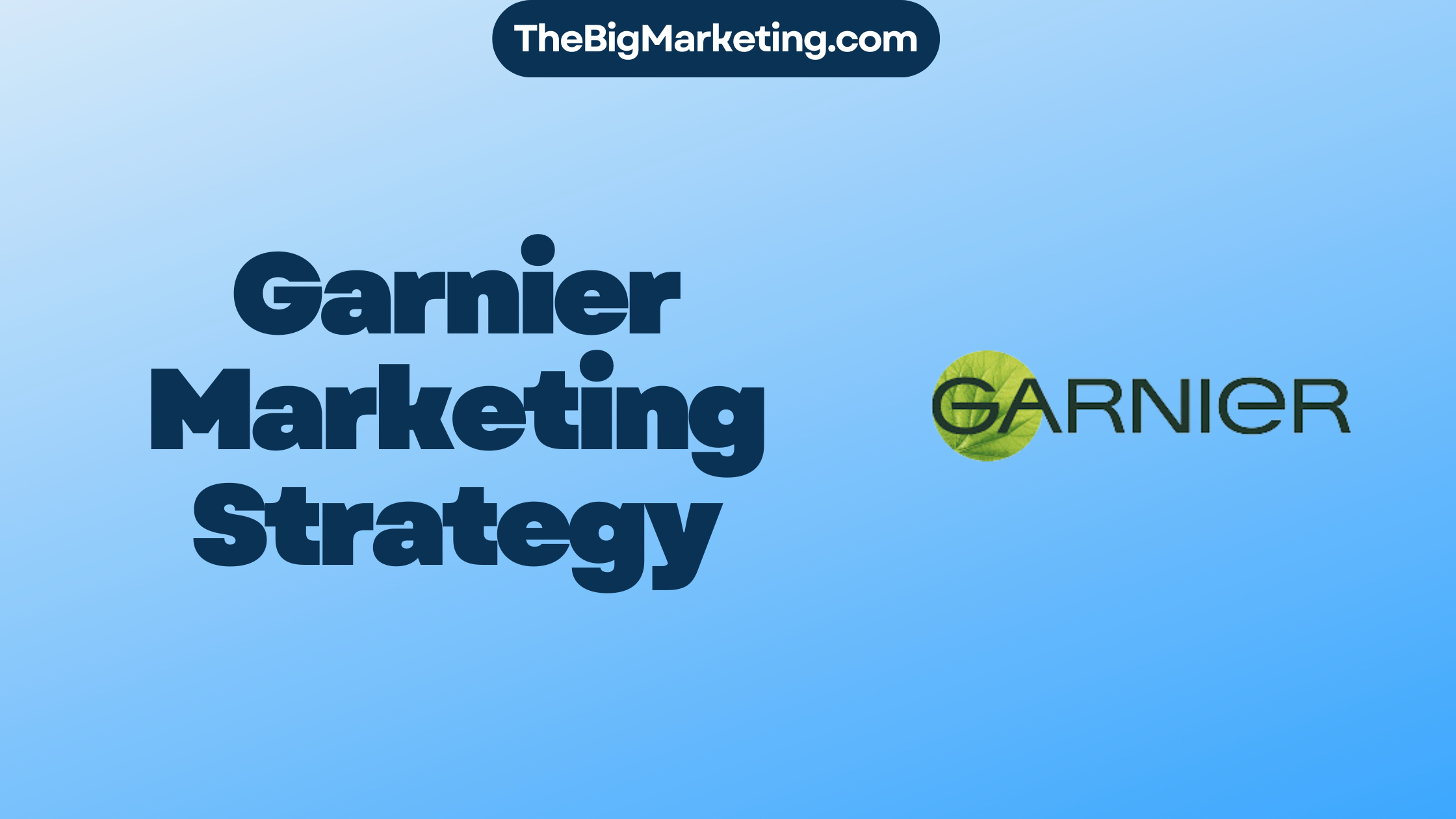Small business marketing focuses on establishing a strong online presence, but options aren’t limited to just the web. Optimizing marketing strategy is key to success. Small business marketing means using every available resource to share, promote, and build brand awareness. It is important to understand how it works and what options are best for your business. Small businesses marketing share their message and establish a presence and sense of authority around their brand. There are many different types of small business marketing, including email marketing, social media marketing, content marketing, search engine optimization, mobile marketing, and traditional marketing.
Key Takeaways:
- Digital marketing strategies are essential for small businesses to establish a strong online presence.
- Optimizing marketing strategies is crucial for small business success.
- Small businesses should explore various marketing options to effectively share their message and build brand awareness.
- Email marketing, social media marketing, content marketing, search engine optimization, mobile marketing, and traditional marketing are popular strategies for small businesses.
- Understanding and utilizing the right marketing techniques will help small businesses establish authority and engage with their target audience.
What Is Small Business Marketing?
Small business marketing is an essential strategy for businesses to increase brand awareness, expand their customer base, and boost sales. By utilizing various resources and channels, small businesses can effectively share, promote, and build awareness around their brand. The ultimate goal is to engage with new audiences, provide valuable information, and gain insights into successful marketing strategies.
Marketing efforts for small businesses can vary based on available budget and time constraints. It is crucial to understand the workings of small business marketing and identify the most suitable options for your specific business.
Through strategic marketing initiatives, businesses can reach potential customers, increase brand visibility, and establish a sense of authority within their industry. By leveraging different marketing tools and techniques, small businesses can effectively compete in today’s competitive marketplace.
To enhance brand awareness, small business marketing focuses on:
- Creating compelling content
- Utilizing social media platforms
- Implementing email marketing campaigns
- Optimizing search engine rankings
- Implementing traditional marketing techniques
Brand Awareness and Customer Base Growth
Small business marketing is crucial for establishing and growing a customer base. By effectively promoting your brand, you can attract new customers who may not be familiar with your business. Marketing efforts help create a presence in the market, sparking interest among potential customers.
Through targeted marketing campaigns, businesses can not only reach new audiences but also engage with them in real-time. By offering valuable information and solutions, businesses can build trust and establish authority, further expanding their customer base.
Driving Sales through Marketing
The primary goal of small business marketing is to drive sales. By creating brand awareness and reaching a wider audience, businesses increase their chances of conversions and sales growth. Marketing efforts help attract potential customers, educate them about the brand or product, and convince them to make a purchase.
Utilizing effective marketing strategies allows businesses to highlight their unique selling points, demonstrate value, and differentiate themselves from competitors. By consistently engaging with customers and showcasing the benefits of their products or services, small businesses can drive sales and achieve long-term success.
| Benefits of Small Business Marketing | |
|---|---|
| 1. | Increase brand awareness |
| 2. | Expand customer base |
| 3. | Drive sales and revenue growth |
| 4. | Establish authority and credibility |
| 5. | Engage with customers in real-time |
| 6. | Gain insights into successful strategies |
Why Is Small Business Marketing Important?
Small business marketing is crucial for building a successful brand and reaching a wider audience. It plays a vital role in establishing your brand message, increasing customer awareness, and building authority within your industry. By implementing effective marketing strategies, small businesses can create a strong online presence and connect with potential customers.
One of the main reasons small business marketing is important is that it allows you to share your brand message with customers who may not be familiar with your business. By leveraging various marketing channels, such as social media, email marketing, and content marketing, you can reach new audiences and engage with them in real time.
By consistently creating and sharing valuable content across different platforms, you can establish a presence and sense of authority around your brand. This helps to build trust with your target audience and position your business as a reliable source of information and solutions.
Moreover, effective small business marketing allows you to gain valuable insights into what strategies work best for your business. By analyzing customer engagement, feedback, and conversion rates, you can constantly refine and improve your marketing efforts. This data-driven approach helps you make informed decisions and develop future strategies that align with your business goals and resonate with your audience.
Benefits of Small Business Marketing
- Increased brand visibility and customer awareness.
- Establishment of authority and trust within your industry.
- Engagement with new audiences in real time.
- Offering valuable information and solutions to customers.
- Insights into successful marketing strategies for future growth.
| Reasons Why Small Business Marketing Is Important: |
|---|
| 1. Building brand visibility and customer awareness |
| 2. Establishing authority within the industry |
| 3. Engaging with new audiences in real time |
| 4. Providing valuable information and solutions |
| 5. Gaining insights into successful marketing strategies |
Types of Small Business Marketing
When it comes to small business marketing, there are various options available to promote and grow your brand. Understanding the different types of marketing strategies and their benefits is crucial for making strategic choices that yield better outcomes. Here are some of the key types of small business marketing:
Email Marketing
Email marketing involves sending targeted emails to prospective, current, and former customers. It allows businesses to customize their messages and provide valuable information to specific customer segments. To collect email addresses, businesses can use methods like website sign-ups, contests, incentives, and discounts.
Social Media Marketing
Social media marketing utilizes popular platforms like Facebook, Instagram, Twitter, and TikTok to reach and engage potential customers in real time. By creating compelling content and leveraging audience engagement, businesses can build brand awareness and establish a strong social media presence.
Content Marketing
Content marketing focuses on creating and distributing valuable, relevant, and informative content to engage and attract customers. Through blog posts, articles, videos, and other forms of content, businesses can establish themselves as industry authorities and strengthen customer relationships.
Search Engine Optimization (SEO)
Search Engine Optimization (SEO) marketing aims to improve a business’s visibility on search engine results pages. By optimizing website content, conducting keyword research, and analyzing competitors, businesses can increase their rankings and attract organic traffic to their websites.
Mobile Marketing
Mobile marketing targets users on their mobile devices through strategies like location-based ads and mobile-friendly websites. With the prevalence of smartphones, businesses can effectively reach and engage potential customers wherever they are.
Traditional Marketing
Traditional marketing involves offline advertising efforts like magazine ads, billboards, direct mail, radio ads, and TV ads. While digital marketing has gained popularity, traditional marketing can still be effective, particularly in reaching specific target audiences or promoting certain products or services.
By incorporating a mix of these marketing strategies and utilizing the right platforms and channels, small businesses can maximize their marketing efforts and achieve their business goals.
Email Marketing
Email marketing is a highly effective and cost-efficient strategy for small businesses to reach their target audience. By sending mass emails, businesses can communicate directly with prospective, current, and former customers, delivering targeted information right to their inbox.
One of the key advantages of email marketing is the ability to customize the message to fit the business and engage specific groups of customers. Whether it’s promoting a new product, sharing valuable content, or offering exclusive discounts, email marketing allows businesses to tailor their communication for maximum impact.
In order to implement email marketing successfully, businesses need to collect email addresses from their audience. This can be achieved through various methods, such as website sign-ups, contests, incentives, and discounts. By building a robust email list, businesses can ensure that their messages reach a wide and receptive audience.
An effective email marketing campaign should include well-designed and engaging emails that provide value to the recipients. Whether it’s showcasing new products, sharing industry insights, or offering personalized recommendations, the content of the emails should resonate with the target audience.
Furthermore, businesses should utilize email marketing software that allows for easy email automation and analytics tracking. This enables businesses to schedule and send emails at optimal times, track open rates and click-through rates, and analyze the success of their campaigns. By leveraging data-driven insights, businesses can refine their email marketing strategies and continuously improve their results.
Email marketing is a powerful tool that can drive customer engagement, increase brand awareness, and ultimately boost sales for small businesses. By harnessing the potential of email marketing, businesses can effectively deliver targeted information and strengthen their relationship with their audience.
Social Media Marketing
Social media marketing is a powerful strategy that allows businesses to connect with their target audience, build brand awareness, and drive engagement in real time. By utilizing popular platforms such as Instagram, TikTok, Twitter, and Facebook, businesses can effectively reach potential customers and establish a strong online presence.
One of the key advantages of social media marketing is its ability to facilitate audience engagement. Through interactive content formats like polls, quizzes, and live videos, businesses can encourage active participation and foster meaningful conversations with their followers. This not only helps to build relationships but also creates a sense of community around the brand.
To succeed in social media marketing, it is crucial to stay updated on the latest trends and platforms. The digital landscape is constantly evolving, and what may be popular today could be replaced by a new trend tomorrow. Keeping a pulse on trending platforms and tactics enables businesses to adapt their strategies and stay ahead of the competition.
Trending Platforms in Social Media Marketing
When it comes to social media marketing, it’s important to identify the platforms that resonate most with your target audience. Let’s take a look at some of the trending platforms:
| Platform | Description |
|---|---|
| With over a billion active users, Instagram is a visual-centric platform that offers various content formats like photos, videos, stories, and reels. It is particularly popular among younger demographics and is known for its influencer culture. | |
| TikTok | TikTok has exploded in popularity, especially among Gen Z users. The platform allows users to create and share short-form videos set to music. Its algorithmic feed makes it easy for businesses to reach a wide audience and gain viral traction. |
| Twitter is a real-time microblogging platform that enables businesses to share concise updates, engage in conversations, and participate in trending topics through tweets. It is a powerful tool for brand promotion, customer service, and industry thought leadership. | |
| As one of the largest social media platforms globally, Facebook offers a wide range of features for businesses, including brand pages, groups, and targeted advertising. It allows businesses to reach diverse audiences and promote products or services effectively. |
By leveraging these trending platforms and tailoring content to suit each one, businesses can maximize their reach and engage with their target audience effectively. Remember, in social media marketing, it’s not just about being present on these platforms, but also about creating compelling content that resonates with your audience.
Content Marketing
Content marketing is a powerful strategy that enables businesses to build strong customer relationships by creating and distributing valuable, relevant, and entertaining content. By consistently providing high-quality content, businesses can establish themselves as authorities in their respective industries while capturing and retaining the attention of their target audience throughout the buyer’s journey.
Customer relationships are at the core of content marketing. By delivering valuable information and addressing the needs and pain points of their audience, businesses can foster trust, loyalty, and long-term customer relationships. Through engaging and informative content, businesses can position themselves as trusted advisors, making it more likely for customers to choose their products or services.
The key to successful content marketing lies in creating valuable content that resonates with the target audience. This can take various forms such as blog posts, articles, videos, podcasts, infographics, and more. The content should be tailored to the interests and preferences of the target audience, providing them with actionable insights, helpful advice, and entertainment.
Establishing authority is another critical aspect of content marketing. By consistently producing valuable content and sharing industry knowledge, businesses can position themselves as thought leaders. This builds credibility and trust, allowing businesses to influence the opinions and decisions of their target audience. As a result, customers are more likely to turn to these trusted authorities when making purchasing decisions.
Furthermore, content marketing plays a vital role in attracting organic traffic to a business’s website and improving its search engine rankings. When businesses consistently publish valuable content, search engines recognize their authority and relevance, leading to higher rankings in search results. This increased visibility results in more traffic, more leads, and ultimately more conversions.
Overall, content marketing is a highly effective strategy for strengthening customer relationships, establishing authority, and driving business growth. By consistently delivering valuable content, businesses can build trust, nurture loyal customers, and position themselves as industry leaders. It is a key component of any comprehensive marketing strategy, enabling businesses to stand out in a crowded digital landscape.
| Benefits of Content Marketing | Examples |
|---|---|
| 1. Builds strong customer relationships | – Providing informative blog posts – Creating engaging videos |
| 2. Establishes brand authority | – Sharing industry insights – Publishing thought leadership articles |
| 3. Attracts organic traffic | – Optimizing website content for SEO – Creating shareable social media content |
| 4. Increases conversions | – Offering valuable gated content – Developing lead nurturing email campaigns |
Search Engine Optimization (SEO) Marketing
Search Engine Optimization (SEO) marketing plays a crucial role in driving organic traffic to a business website. By optimizing website content and structure, businesses aim to achieve higher rankings on search engine results pages. Let’s explore the key components of effective SEO marketing.
Keyword Research
Keyword research is a fundamental aspect of SEO marketing. By identifying relevant keywords and phrases that potential customers are using in search queries, businesses can optimize their website content accordingly. This research helps websites attract more targeted traffic and improve their visibility in search engine results.
Internal Linking
Internal linking refers to connecting different pages within a website using hyperlinks. It helps search engines understand the structure and hierarchy of the website, making it easier for them to crawl and index the pages. Effective internal linking can also improve user experience by guiding visitors through relevant content and increasing the time they spend on the website.
Image Optimization
Image optimization is an often overlooked aspect of SEO marketing. Optimized images can enhance website performance by reducing page load times and improving user experience. By using descriptive file names and alt tags containing relevant keywords, businesses can improve their chances of appearing in image search results and attracting more organic traffic.
Competitive Analysis
A thorough competitive analysis is essential for successful SEO marketing. By examining the strategies of competitors who are ranking higher on search engines, businesses can gain valuable insights and identify opportunities for improvement. Analyzing their keyword usage, content quality, and backlink profiles can help businesses refine their own SEO strategies.
Implementing these SEO marketing techniques improves website visibility, attracts more organic traffic, and ultimately leads to higher rankings on search engine results pages. By providing valuable, relevant, and optimized content, businesses can increase their online presence and gain a competitive edge in the digital landscape.
| Benefits of SEO Marketing | Components |
|---|---|
| Higher rankings on search engine results pages | Keyword Research |
| Increase in organic traffic | Internal Linking |
| Improved website performance and user experience | Image Optimization |
| Identification of competitor strategies | Competitive Analysis |
By incorporating effective SEO marketing strategies, businesses can enhance their online visibility, drive targeted traffic to their website, and ultimately achieve their marketing goals.
Mobile Marketing
In today’s digital landscape, mobile marketing has become an essential component of any successful business strategy. With the increasing use of smartphones and mobile devices, reaching potential customers through their mobile screens has never been more important. Mobile marketing allows businesses to target and engage with their audience on the go, delivering tailored messages and offers that resonate with their needs and interests.
One effective mobile marketing technique is location tracking. By leveraging location-based data, businesses can deliver targeted ads and promotions to users in specific geographic areas. This enables them to reach customers at the right place and time, increasing the chances of conversion and driving foot traffic to physical stores.
To ensure a seamless user experience, mobile-friendly websites are a must. With the majority of internet browsing now happening on mobile devices, having a responsive and optimized website is essential. It ensures that potential customers can easily navigate your site, find the information they need, and make purchases or inquiries without any usability issues.
Mobile advertising is another crucial aspect of mobile marketing. By running ads on mobile platforms and apps, businesses can increase brand visibility and attract potential customers. Mobile ads come in various formats, including search ads, display ads, and video ads. They can be placed strategically throughout the mobile user’s journey, from browsing social media to using mobile apps, maximizing the chances of capturing their attention and driving engagement.
Integrating mobile marketing into your overall marketing strategy is not only cost-effective but also ensures that you reach potential customers wherever they are. By harnessing the power of location tracking, mobile-friendly websites, and targeted mobile ads, businesses can create impactful mobile marketing campaigns that drive results and boost their bottom line.
Traditional Marketing
In today’s digital age, where online marketing dominates the landscape, traditional marketing still holds its ground as an effective strategy for reaching specific audiences. Traditional marketing encompasses various offline advertising efforts, including magazine ads, billboards, direct mail, radio ads, and TV ads.
Magazine ads allow businesses to showcase their products or services to a targeted audience with specific interests. Placing an ad in a relevant magazine can increase brand awareness and attract potential customers who actively engage with the publication.
Billboards offer a high-impact, visually compelling way to capture the attention of commuters and passersby. With strategic placement in high-traffic areas, billboards can generate significant exposure for a brand or message.
Direct mail campaigns involve sending printed materials, such as postcards or brochures, directly to a target audience’s physical mailbox. This personalized approach can be highly effective in engaging customers and generating leads.
Radio ads allow businesses to reach a wide audience while leveraging the power of storytelling and the emotional impact of sound. With radio’s broad listenership, businesses can effectively convey their message and create brand affinity.
TV ads continue to be a powerful medium for reaching a mass audience. Television’s visual and auditory impact, combined with a captive audience, can effectively communicate brand messages and elicit emotional responses.
While digital marketing has gained significant popularity, traditional marketing can still provide value depending on the target audience and the product or service being marketed. It’s important for businesses to consider their specific marketing goals and audience preferences when determining the mix of traditional and digital strategies that best align with their overall marketing strategy.
| Traditional Marketing Channel | Benefits |
|---|---|
| Magazine Ads | Targeted audience reach Visual appeal Build brand awareness |
| Billboards | High visibility Capture attention Geographic targeting |
| Direct Mail | Personalized approach Tangible and memorable Generate leads |
| Radio Ads | Wide reach Storytelling potential Emotional impact |
| TV Ads | Mass audience reach Visual and auditory impact Emotional connection |
Small Business Marketing Tools
Streamlining and automating small business marketing strategies is essential for success in the digital age. Fortunately, there are numerous tools and technologies available to help small businesses effectively implement and track their marketing efforts.
Email Marketing Software
Email marketing software is a powerful tool that allows businesses to send targeted, personalized emails to their customer base. With features like email automation, customizable templates, and advanced analytics, businesses can optimize their email campaigns for maximum impact and engagement. Popular email marketing software options include Mailchimp, Constant Contact, and ConvertKit.
Social Media Marketing Platforms
Social media marketing is a key component of any small business’s digital marketing strategy. Social media marketing platforms like Hootsuite, Sprout Social, and Buffer enable businesses to manage and schedule their social media content, engage with their audience, and analyze their social media performance. These platforms help businesses maintain a consistent and active presence on popular social media networks.
Analytics Tools
Analytics tools play a crucial role in small business marketing, providing valuable insights into customer behavior, website performance, and campaign effectiveness. Google Analytics is a widely-used analytics tool that offers in-depth data analysis and reporting capabilities. It helps businesses track website traffic, understand audience demographics, and measure the success of marketing campaigns. Other analytics tools like Moz and SEMrush provide competitive analysis, keyword research, and search engine optimization (SEO) insights.
| Email Marketing Software | Social Media Marketing Platforms | Analytics Tools |
|---|---|---|
| Mailchimp | Hootsuite | Google Analytics |
| Constant Contact | Sprout Social | Moz |
| ConvertKit | Buffer | SEMrush |
By leveraging these small business marketing tools, businesses can efficiently manage their marketing campaigns, drive customer engagement, and track the effectiveness of their strategies. Whether it’s email marketing software, social media marketing platforms, or analytics tools, using the right tools can make a significant difference in the success of a small business’s marketing efforts.
Conclusion
Creating a comprehensive business marketing strategy is crucial for success in 2024. By understanding the different types of marketing options and identifying the target audience, businesses can effectively reach their audience, increase brand awareness, and drive sales. Utilizing the right tools and technologies, and staying updated on emerging marketing trends, allows businesses to adapt and stay ahead of the competition.
Tracking key performance indicators is essential to measure the success of a marketing strategy and maximize ROI. It provides valuable insights into what is working and what needs improvement. Being able to adjust the strategy accordingly ensures continuous growth and allows businesses to remain competitive in the ever-changing market.
The importance of a well-defined marketing strategy cannot be overstated. It lays the foundation for success by guiding businesses in making informed decisions and allocating resources effectively. In a dynamic business environment, having a clear direction and understanding the importance of a marketing strategy sets businesses up for long-term growth and success.





